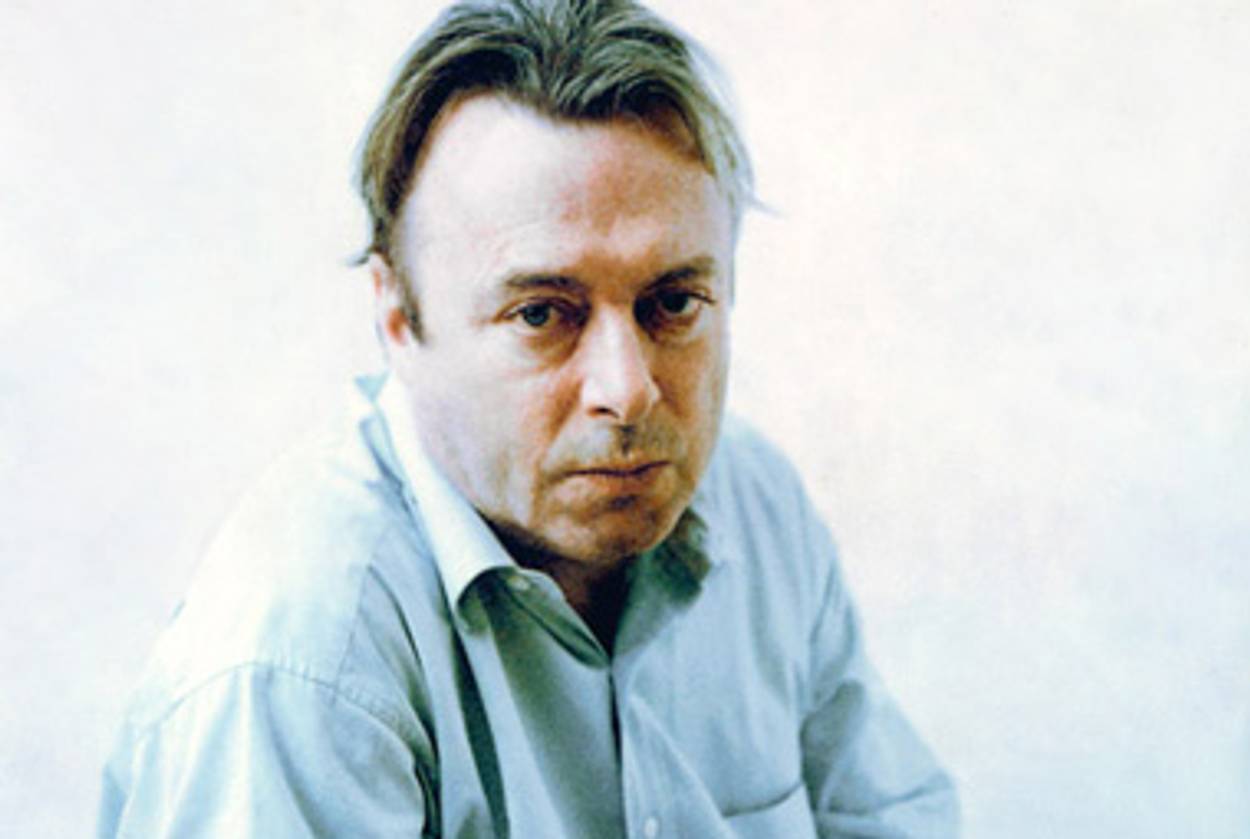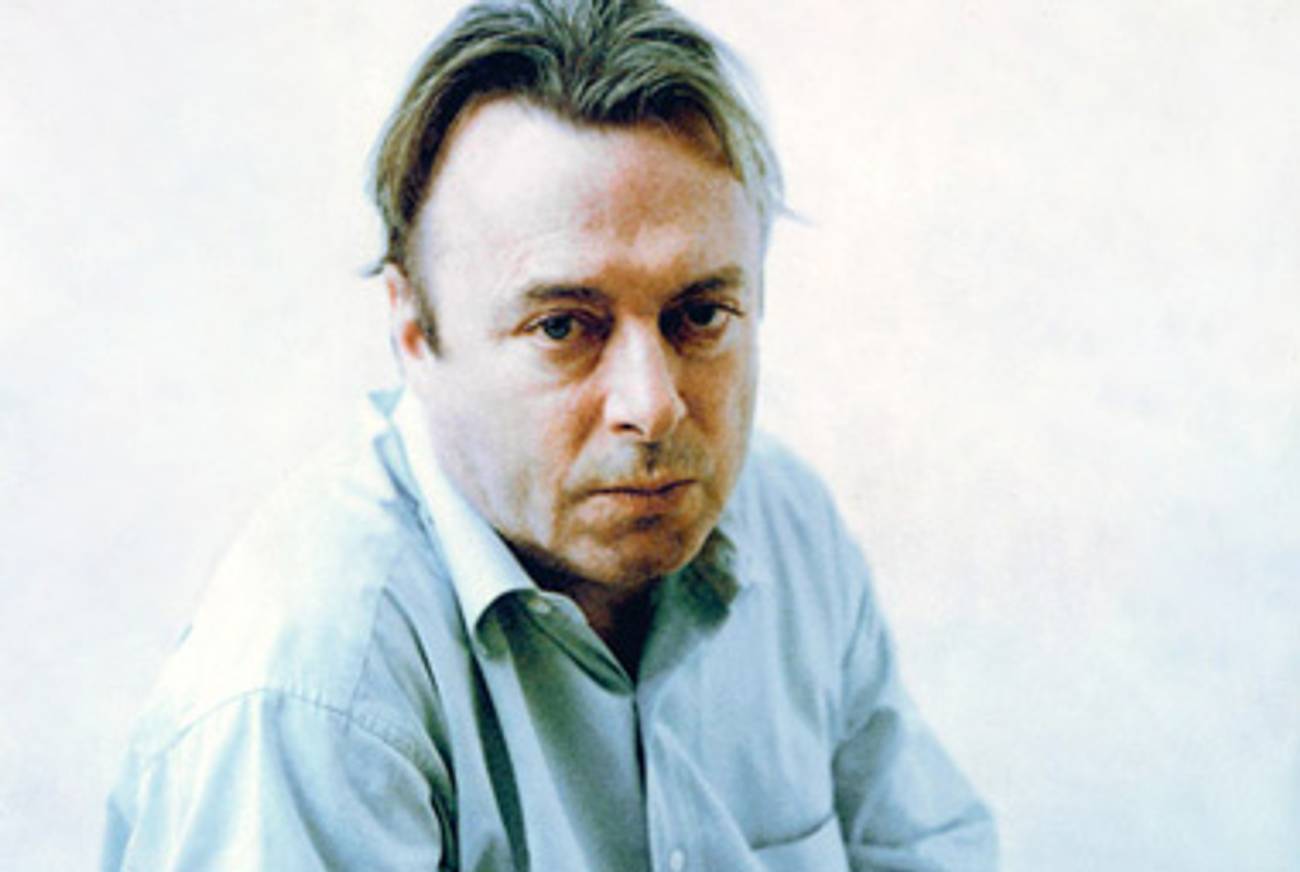On the Contrary
In his new memoir, Christopher Hitchens recounts the rich history of his public crusades




The most revealing moment in Hitch-22, the new memoir by the writer and controversialist Christopher Hitchens, comes near the end, when he poses to himself the set of questions known to readers of Vanity Fair as the “Proust Questionnaire.” The remarkable thing is not Hitchens’ reply to questions like “Where would you like to live?” or “To what faults do you feel most indulgent?” but the fact that, more than 300 pages into a book about his life, Hitchens resorts to this device—originally a 19th-century party game—because “I thought it might be of interest if I said a few words about what I am actually ‘like.’ ” This is a subject that you might think would have come up earlier. But it is, ironically, very revealing that Hitchens shuns revelation as long as possible and then engages in it only in a witty, schematic form. (“Q: What do you value most in your friends? A: Their continued existence.”)
As a writer—and, it would appear, as a man—Hitchens is relentlessly extroverted: He defines himself by his obsessions and crusades, by the fights he picks. Unwittingly, however, Hitch-22 raises a question that must haunt our encounters, not just with Hitchens, but with all intellectuals who deal with large issues of politics and religion. It is not difficult to address oneself to controversies, or to come up with opinions about them, or even to defend those opinions eloquently. Certainly it is not difficult for Hitchens, who has become famous for doing these things. Since he started his career as a leftist journalist and activist, in the late 1960s, there have been few public issues about which he has failed to have, and state, an opinion. The bulk of Hitch-22 recounts these crusades, from his work as an Oxford student for the International Socialists (a Trotskyite, anti-Soviet faction) to his behind-the-scenes advocacy, in the 1990s, for the overthrow of Saddam Hussein.
But an opinion is only as valuable as the person who holds it—and how can anyone bring wisdom to bear on public questions when he avoids private thought? To paraphrase a source for which Hitchens has notoriously little use: What does it profit a man to gain a whole worldview, if he loses (or forgets about) his soul? “I would often rather have an argument or a quarrel than be bored, and because I hate to lose an argument, I am often willing to protract one for its own sake rather than concede even a small point,” Hitchens admits. He calls this the “ ‘down’ side of one of my happier skills,” his skill at debate, which he has lately employed in humiliating clergymen around the world. What he does not consider is that that skill may itself be “unhappy”: Socrates distinguished between philosophy, which is the love of wisdom, and sophistry, which is the ability to argue convincingly, even for bad purposes. To a vocational arguer, what matters is arguing, not understanding (especially when, as Hitchens says, he is obligated to produce 1,000 words of clean copy every single day). That’s why it seems almost too perfect that Hitchens should have been invited to the Vatican, during the canonization hearings for Mother Teresa, to serve as a freelance Devil’s Advocate—the one job in which argument is intentionally divorced from wisdom.
In fact, Hitchens is at his best arguing in the negative, which is why his best-known views are his hatreds—of Mother Teresa (a pious fraud), Henry Kissinger (a war criminal), Bill Clinton (a liar), and God (all of the above). Hitch-22 suggests that Hitchens’ preference for the role of scold and scourge has biographical origins. He was born in 1949 to ill-matched parents: His father, Eric, was a commander in the Royal Navy, a veteran of World War II, taciturn and conservative in a familiar English style. His mother, Yvonne, was imaginative and socially ambitious, as exotic as her name: “my shell-like ear detected quite early on a difference between this and the various comfortable Nancys and Joans and Ethels and Marjories who—sterling types all—tended to be the spouses and helpmeets of my father’s brother-officers.”
The marriage would eventually come to a sad end—the only real personal sadness that Hitchens describes in the book. When he was in his early twenties, his mother left his father for another man, and Yvonne and her lover ended up committing suicide together at a hotel in Athens. Christopher was the one responsible for flying there and claiming the body. As it happens, this moment of supreme personal tragedy coincided with a political upheaval, and he spent much of his time in Athens interviewing dissidents who had been tortured by the Greek junta. “With Yvonne lying cold? You are quite right to ask,” Hitchens writes. “But it turns out, as I have found in other ways and in other places, that the separation between the personal and the public is not so neat.”
It would be easy, perhaps too easy, to read this as a flight from inwardness into the public realm, where Hitchens is far more comfortable. At the very least, it seems clear that his vocation was a way of synthesizing the warring legacies of his parents. His mother, he writes, wanted nothing more than for him to rise socially, to have the glamorous life that a Navy wife never could. That is why she insisted on Christopher being sent to private school and eventually to Balliol. Writing has done the trick in this regard: So many famous names are dropped in Hitch-22 that it stops being a vice and becomes a technique of self-portraiture. The names fall into two categories, literary (James Fenton, Salman Rushdie, Robert Conquest) and political (Paul Wolfowitz, Michael Chertoff, opposition figures from Argentina to Cyprus). Yet even the most intimate of these friendships, with Martin Amis, is characterized mainly by laddishness and word games: Hitchens devotes a surprising amount of time to recounting the results of a game where “fuck” is substituted for “love” in famous titles. No doubt there is real intimacy also, but Hitchens is uninterested in recording it, or unable to. Certainly there is next to nothing in Hitch-22 about his romantic life, his marriage, or his children.
From his father, whom he respectfully calls “the Commander,” Hitchens takes the other imperative of his work, that writing be a kind of fighting. Many of Hitchens’ fans on the left were surprised when he came out in favor of the invasion of Iraq in 2003. They wouldn’t have been if they had realized how much he honors his father’s experience fighting a just war, and how often in his career he has sought occasions for honorable aggression. He is haunted by his failure to experience combat, and though he dwells on moments when his life has been in danger—reporting from Belfast and Sarajevo—he fears “that I lack the courage to be a real soldier or a real dissident. I have seen just enough warfare and political violence to know that, while I was pleased not to ‘crack’ at first coming under fire, I could never be a full-time uniformed combatant or freedom fighter, or even war correspondent.”
This shame is the subtext of the most powerful section in Hitch-22, where Hitchens writes about a young American soldier named Mark Daily, who was killed in Iraq in 2007. Daily, Hitchens learns, was motivated to join the Army by reading his fire-breathing articles in support of the war; Hitchens even learns, from the soldier’s parents, that Daily “tried to contact [him] from Kuwait or Iraq.” He records feeling “hollow,” a “deep pang of cold dismay.” It is the rare moment when Hitchens experiences a profound responsibility for the opinions he shares so readily.
One other ancestral legacy did not reach Hitchens until he was an adult. As he has written before, he learned in his thirties that his mother’s mother, whom he had known as Dorothy Hickman, was Jewish, her maiden name Levin. Yvonne had concealed this part of her ancestry from her husband and children, presumably in order to make things easier for herself socially. The revelation of his Jewish background came too late to shape Hitchens’ identity in any profound way: “I had to ask myself what Jewishness had meant to me, if anything, when I was a boy. I was completely sure that it meant nothing at all until I was thirteen, except as a sort of subtext to the Christian Bible stories.”
The main effect of “being a Jew” (as he puts it, though this is true only in the legalistic, matrilineal sense) on the adult Hitchens, it seems, has been to make him subscribe to the most clichéd view of Jewishness as perpetual dissent. “Wasn’t there still something in this age-old identification of the Jew with the subversive? If so, good,” he writes. Being a Jew becomes another credential of contrarianism, even though Hitchens’ own story is a perfect demonstration that contrarianism is a character trait, not a Jewish cultural or genetic imperative. Certainly it does not give him any new sympathy with the state of Israel: “I even think that a sixty-year rather botched experiment in marginal quasi-statehood is something the Jewish people could consider abandoning. It represents barely an instant in our drawn-out and arduous history.”
“Our” is useful here, rhetorically, giving a Jewish tincture to anti-Zionist opinions formed long before Hitchens learned that one of his four grandparents was Jewish. But many of Hitchens’ other opinions have changed over the years, and his current views—about the need to defend democracy, and the overwhelming danger of Islamic totalitarianism—seem to point in the direction of a change of heart here, too. It would not be at all surprising to hear Hitchens, in five or 10 years, arguing that the defense of Israel against Hamas and Hezbollah is a moral imperative. Already, he shows, the divergence of his views on the Middle East from Edward Said’s led him to lose Said’s friendship. What is certain is that, whatever it may be, Hitchens will have an opinion—after all, as his hero Voltaire once put it, c’est son métier.
Adam Kirsch is a poet and literary critic, whose books include The People and the Books: 18 Classics of Jewish Literature.
Adam Kirsch is a poet and literary critic, whose books include The People and the Books: 18 Classics of Jewish Literature.